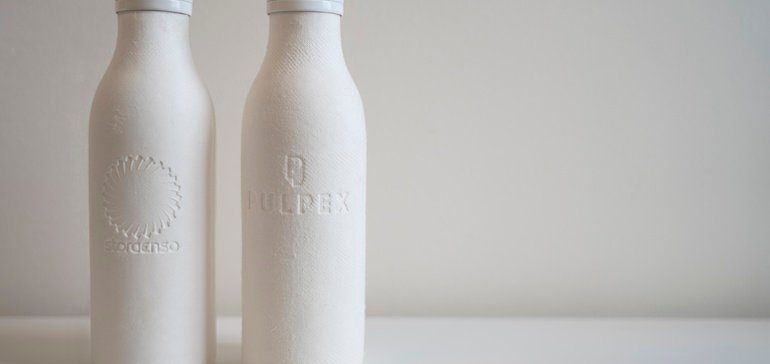Diageo’s Pulpex partners with Stora Enso to ramp up paper bottle production

Dive Brief:
-
Pulpex, a packaging technology company co-founded by Diageo, has partnered with Finnish renewable materials company Stora Enso to mass produce 100% recyclable bottles and containers made from sustainably sourced, formed wood fiber pulp. The companies plan to have a high-speed production line operational in 2022.
-
Pulpex will use Stora Enso’s formed fiber material to create paper bottles for global brands in applications including alcohol and nonalcohol beverages and liquid foods, along with home and personal care products. The Pulpex bottle can be embossed, labeled and colored, according to the companies.
-
Diageo and PepsiCo have committed to using Pulpex technology in their packaging as founding partners of a consortium of CPG companies who together plan to produce 750 million paper bottles per year. This latest partnership would help advance that effort, and could assist both beverage companies in meeting their broader sustainable packaging goals.
Dive Insight
In 2020, Diageo and venture management company Pilot Lite launched Pulpex Limited to create “the world’s first ever 100% plastic free paper-based spirits bottle, made entirely from sustainably sourced wood.” The bottle, set to debut with Diageo’s Johnnie Walker scotch whisky in early 2021, is designed to be fully recyclable in standard waste streams. It was one step toward meeting the Smirnoff and Guinness manufacturer’s goal to have all of its have all its packaging be widely recyclable by 2030 as part of its 10-year sustainability action plan.
PepsiCo has said it plans to pilot branded paper bottles with Pulpex’s technology in 2021 in the nonalcoholic beverage space. With its involvement in the Pulpex consortium, PepsiCo is targeting its broader sustainability goal of making 100% of its packaging recyclable, compostable or biodegradable by 2025.
Pulpex and Stora Enso’s bottles are 100% PET-free, meaning they can decompose easily and also be recycled like paper, according to the companies. They note that 80% of paper and cardboard is recycled in the U.S. and European Union, while that figure is closer to 30%-40% for plastic, and 75%-80% for glass and aluminum.
That said, while paper products have a higher recycling rate, PET plastic bottles are widely accepted for recycling and in demand among recyclers. The Consumer Brands Association reported that the secondary market for recycled PET beverage bottles and jars has jumped 28% in the past year.
While paper packaging can be more sustainable, this also depends on how it’s produced. When paper packaging is sealed with materials like plastic or resin, it’s unable to be recycled, as reported by Forbes. Brands often use these materials to reduce leaks and improve the consumer experience. Even common alternatives like TetraPak have to be separated by layer before a recycling facility can take them.
Companies’ pursuit of sustainable packaging is happening as overall consumer demand for new options grows. Two-thirds of consumers consider it important for the products they buy to have sustainable packaging, according to Trivium Packaging’s 2021 Global Buying Green Report.
In recent years, other beverage companies have tackled the challenge of adopting more environmentally friendly packaging from different angles, with a shift away from plastic. Beverage giant Keurig Dr Pepper, which owns Evian, 7-Up and other brands, has committed to cutting the use of new plastics in packaging by 25% by 2025 by increasing its use of recycled content, redesigning packaging and other measures, and aims to use 100% recyclable or compostable packaging by the same deadline. Coca-Cola is moving to 100% recyclable plastic packaging across its entire portfolio, and away from aluminum use in some of its smaller drink offerings.

